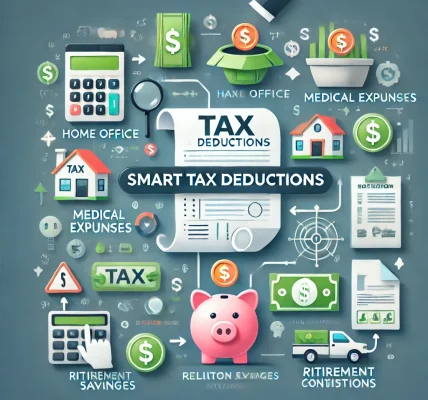Introduction
Tax planning is a crucial aspect of personal finance. Reducing taxable income legally not only helps in saving money but also ensures compliance with tax laws. There are various provisions under the Income Tax Act, 1961, that allow individuals to optimize their tax liabilities. This guide will walk you through legal strategies to reduce your taxable income while staying within the law.
1. Choose the Right Tax Regime: Old vs. New
The government provides two tax regimes:
- Old Tax Regime: Allows multiple deductions and exemptions but has higher tax rates.
- New Tax Regime: Offers lower tax rates but eliminates most deductions.
Which One to Choose?
- If you have significant investments in tax-saving instruments, the old regime is better.
- If you prefer a simplified structure with lower tax rates, the new regime may be beneficial.
2. Maximize Section 80C Benefits (Up to ₹1.5 Lakh)
Section 80C allows deductions up to ₹1.5 lakh annually through:
- Employee Provident Fund (EPF)
- Public Provident Fund (PPF)
- Equity-Linked Savings Scheme (ELSS)
- National Pension System (NPS)
- Tax-saving Fixed Deposits (FDs)
- Life Insurance Premiums
- Sukanya Samriddhi Yojana (SSY)
- Tuition Fees for Children
3. Utilize Additional Deductions Beyond Section 80C
Apart from 80C, consider the following deductions:
- Section 80D: Health insurance premiums (₹25,000 for self/family, ₹50,000 for senior citizens).
- Section 80E: Education loan interest (no limit on amount).
- Section 80G: Donations to registered charities (up to 100% deduction for eligible organizations).
- Section 80TTA/80TTB: Interest earned from savings accounts (₹10,000 for individuals, ₹50,000 for senior citizens).
4. Avail Home Loan Tax Benefits
Owning a home comes with tax advantages:
- Section 80C: Deduction on principal repayment (₹1.5 lakh limit).
- Section 24(b): Deduction on home loan interest (₹2 lakh limit for self-occupied property).
- Section 80EE/80EEA: Additional deductions for first-time home buyers.
5. Optimize House Rent Allowance (HRA)
Salaried employees receiving House Rent Allowance (HRA) can claim a deduction under Section 10(13A) based on:
- Actual rent paid
- HRA received
- 50% of basic salary (metro cities) or 40% (non-metro)
If you do not receive HRA but pay rent, claim Section 80GG benefits (subject to conditions).
6. Contribute to the National Pension System (NPS)
- Additional ₹50,000 deduction under Section 80CCD(1B) beyond the ₹1.5 lakh limit of 80C.
- If your employer contributes to NPS, claim a deduction under Section 80CCD(2).
7. Claim Standard Deduction & Other Exemptions
- Standard Deduction: ₹50,000 for all salaried employees.
- Food Coupons (Sodexo, Zeta, etc.): Tax-free up to ₹2,200 per month.
- Reimbursement of Work-Related Expenses: Internet, telephone, uniform, books, and periodicals are tax-free if reimbursed by your employer.
8. Save Taxes on Investments
Investing in the right financial products can reduce tax liability:
- Tax-free bonds: Earn tax-exempt interest.
- Dividend income from equity investments: Subject to tax but lower than salary income.
- Capital Gains Tax Planning: Invest in assets with long-term tax advantages (e.g., real estate, mutual funds, stocks).
9. Utilize Leave Travel Allowance (LTA)
Employees can claim LTA exemption for domestic travel expenses incurred during official leave (available twice in a block of four years).
10. Plan Your Bonuses & Perquisites Wisely
- If expecting a bonus, negotiate disbursal across two financial years to reduce taxable income.
- Opt for non-taxable perquisites like employer-paid medical insurance, conveyance allowances, or education assistance.
11. Claim Deductions for Medical Expenses & Disability Benefits
- Section 80DD/80DDB: Tax benefits for medical treatment of dependents with disabilities or specified diseases.
- Preventive Health Check-ups: Deduction up to ₹5,000.
12. File ITR on Time & Avoid Penalties
Filing Income Tax Return (ITR) before the deadline ensures:
- Timely claim of refunds.
- Avoidance of penalties (up to ₹10,000 for late filing).
- Carrying forward of losses (if applicable).
13. Maintain Proper Documentation
Keep records of:
- Salary slips
- Investment proofs
- Rent receipts
- Medical bills
Proper documentation helps in smooth tax assessments and audits.
14. Consult a Tax Expert for Better Planning
While DIY tax planning is effective, consulting a Chartered Accountant (CA) or tax expert ensures maximum savings and compliance with evolving tax laws.
Conclusion
Legally reducing taxable income is possible through smart financial planning and by utilizing various deductions and exemptions available under Indian tax laws. By making strategic investments, optimizing salary components, and filing taxes on time, you can significantly minimize tax liabilities. Stay informed and consult experts when needed to ensure a hassle-free tax-saving experience




